| "My sister is very flighty, she falls in love with everyone she meets." |
| Robert (Dominique Besnehard) |
| "I'm not bored, I'm depressed. It's not the same." |
| Suzanne (Sandrine Bonnaire) |
A Nos Amours (To Our Romance) is my first experience with both the work of director Maurice Pialat and Eureka's Masters of Cinema's continued commitment to releasing first rate and much beloved editions of the work of the French auteur. The fifth in a cycle of seven releases by the label, I'm sad to think they won't have a hand in bringing home viewers the two remaining films in Pialat's catalogue that have still to find a home on region 2 DVD. On the evidence of the loving treatment bestowed on this film and a bountiful spread of bonus material, it's a crying shame indeed. Still, there is solace to be found in the fact that I now have no choice but to dive right into the other six releases, and if they're anything up to the standard of what I viewed over the last two days, I can look forward to unearthing a wealth of cinematic treasure. An emotionally raw and gripping film, made all the more bruising thanks to a pristine transfer, the supplements gave invaluable contextual background that greatly enhanced my viewing and reading of the film. It's safe to say, Masters of Cinema's presentation has made me an overnight Pialat convert.
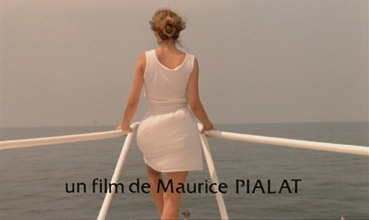
As an entry point into Pialat's cannon, I suspect I couldn't have made a better choice. Widely regarded as his most accessible work, the Cesar award-winning film was also herald by critics upon its release in 1983, as his most inspired. Dan Sallit's 2010 essay in the accompanying booklet extends this praise to the present, confirming it as the "film that cemented Maurice Pialat's standing as an important figure in French cinema".
So why all the fuss over a film documenting the flowering of a 16-year-old's sexual life as her family life falls apart?
First and foremost, what's immediately striking is a definite sense of the taboo in a father/daughter relationship that borders on romantic. More than an infamous talking point, this is the foundation at the core of an otherwise freewheeling film. The translated title refers not to the revolving door of men in Suzanne's (Sandrine Bonnaire) life, but to her father (Maurice Pialat). Furthermore, the primary function of these men is to – however briefly – serve as a direct link to her estranged Dad, who has handed down his own set of complications that Suzanne and the film must now deal with. Pialat's directorial method of unpacking this, is to always skip past carnal aspects of her sexual awakening in favor of post-coital conversation, in which her father is often discussed.
With Matthew Vaughn's Kickass currently courting controversy on screens nationwide, due to a 12-year-old character's liberal use of 'the C word', it's amazing to think how far we've come (or regressed); a point where filmmakers have to strain their responsibility to breaking point just to evoke a reaction. Yet in the seemingly 'anything goes' culture of today, I'd be hard pressed to believe censors would okay long held shots from afar, relishing the supple flesh and ripening bosom of the frequently nude Sandrine Bonnaire, then the same age as her character in the film. Yet, it is precisely because of this distance between camera and subject that the film is able to err away from lingering, lip-smacking perversion. What you have instead is a genuine attempt at visualizing a girl's fraught and awkward transition into womanhood.
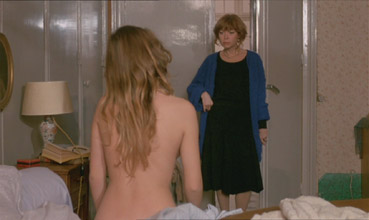
Pialat's directorial stance of emotional detachment makes this acceptable viewing even when his scenes with Bonnaire shudder with a sexual frisson proffered by the filmmakers as innocuous. When the father says "I'm going to leave you" to his daughter he sounds as if he is dumping a lover rather than abandoning a family. Likewise, when she asks, "Have you thought about us?", it's as if she's referring to the two of them and not the family unit. The film is appropriately subtle in never making an explanation mark out of this tension, presenting their dynamic as is, for the viewer to reach his or her own conclusions about whether or not it crosses any lines. That's not to say Pialat doesn't use the nature of this relationship to torment. I spent the whole film fretting about possible transference from their on-screen partnership into their real-life collaboration. The director is after all, very much a father figure on set and here we see a father all too eager have his audience be smitten with the naked splendor of his ingénue daughter. Such mixed messages keep you glued wherever you come down on the issue, simply because Pialat's handling of the psychological aspects of his family portrait is so penetratingly precise. It would be all too easy to slip into speechifying exposition thinly veiled as trenchant analysis, but through his infamous on-set manipulations of his actors' emotions (exhaustively documented in the extras), he's able to break off jagged shards of searing insight that gradually constitute a fractured whole. His severe elliptical jumps in time are as abrasive as his provocation of the cast on and off camera, and though these fissures lay bare the damaging extent of how the family members hurt one another, it is the nature of cracks to only see as far as they allow us, even with our eye right up against them.
Despite this penchant for ellipsis that keeps us struggling for a foothold on Suzanne's emotions, there is no risk of her ever becoming a cipher. The experience of Pialat's characters remains so heartfelt because of his rebellious and cleverly constructed rejoinder towards formal presentation and expected narrative progression. The fourth wall is broken immediately following the title sequence and even before that, Suzanne's rehearsing of lines from a play that serves no narrative purpose whatsoever for the rest of the film. This is an early declaration of reflexive self-awareness of the filmmaking process, cueing up Pialat's continued undermining of projected dramatic formula.
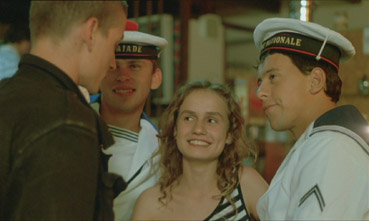
Suzanne's many sexual experiences are not anchored to a linear trajectory. Presented slice-of-life, they are lived and felt to the point of expiration, so that we never get any sense of pecking order or favoritism amongst her many promiscuous flings. Casual conversations achieve rare moments of revelatory intimacy and contrarily, these more intimate relationships prove to be nothing more than transitory.
The summer camp play she performs in the opening proclaims a belief of romantic love as naive as Suzanne's own formative years, that the rest of the film sets about contradicting and corroding.
Pialat may be unconcerned with notions of romantic coming of age but his film is far more rite of passage than story; in fact that of every girl, positioning Sandrine Bonnaire as the personification of youth. In this way the film still comes across more than twenty-five years later, as utterly modern, not unlike the work of Larry Clark and Kids, albeit it far less lascivious. Like the characters that typify Clark's work, Suzanne at first seems impulsively self destructive, though her series of affairs wrong-foot us and ultimately prove us wrong. Only in the blackness of reflection of the credits do they reveal themselves as an essential means of self discovery, especially given her lack of familial support.
In it's depiction of family dysfunction, I had to wonder if writer/director Noah Baumbach counts himself among the admirers of this film. The line of dialogue in the director's latest, Greenberg of "hurt people, hurt people", chimes neatly with Suzanne's late-stage admittance: "I can't live like this. We're hurting each other". Just as cautionary caustic as The Squid & the Whale, Pialat's film askews therapy session pressure release for straw-that-broke-the-camel's-back physical violence. Imagine the Berkman clan of Baumbach's film hopped-up on Bruce Banner Hulk-Smash pills, beating seven shades out of shit out of one another and you're somewhere in the neighborhood. I can't recall a film with quite this much physical familial rage. We see Mum beating Suzanne who beats her back, just as the brother intervenes, only to get beaten by Mum whom he then wrestles to the ground right before giving his sister a thorough hiding. It's like Jerry Springer with Pialat behind the camera as the goading ringmaster.
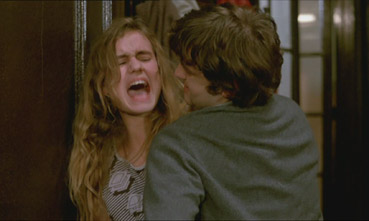
Ahead of its time, A Nos Amours takes the talk show histrionics of the modern audience and prophetically aligns them with the epic family feuds and psychic bruising of Greek tragedy. None is more tragic or damaged than Evelyne Ker, a force of nature as the abandoned mother, a jostling Rubik's cube of venomous, put-upon swagger, ironic self-dramatization and asphyxiating neediness. Suzanne's brother is hardly any better off; a contemptuous asshole of the first order, specializing in barbed criticisms of others to elevate his own standing. The transparency of his coping mechanisms are exposed for all to see when the absentee (and possibly spectral) father returns in the film's iconic dinner table scene. This sudden appearance surprised the cast even more than the audience, who were forced to improvise upon his unexpected interruption, certainly a contributing factor to actor Dominique Besnehard being less than sure of himself for the first time in the film. Mostly mute and on the receiving end of a verbal dressing down, the brother's masochistic addiction to the continued dismissals of his art critic brother in-law shows itself as pitiably blatant.
Remarkable as everyone is, so much is remarkable about Sandrine Bonnaire, that I'd be doing her performance a great disservice calling it anything other than superlative. Sixteen in real life when the film was shot, only her body provides conclusive evidence of this fact. Her face is one of indeterminate age, way beyond her years, suggesting a young woman unable to take pleasure in the exuberant follies of youth because she has somehow already outgrown those feelings.
Inexplicably world-weary before her time, she's a girl who wants to feast on life without yet being able to read the menu. As raging hormones send her pin-balling recklessly between ecstatic happiness and desperate sadness, the scenes themselves as written swerve just as wildly, turning on a dime without warning, each new emotion contradicting the last, before reverting back again. These changes of mood, shifting like uncertain whether, can surely also be attributed to Sandrine Bonnaire's own uncertainty of her craft (though no less assured) in her debut role. As an audience, we're perhaps just as uncertain about in the end, if any important life lessons were actually learned or that maybe this is completely beside the point. Pialat, in typically uncompromising fashion, refuses to let the character or the audience off the hook with unearned resolution of the issues or easy catharsis and the film is all the better for it.
There are certain things that identify a film as one by Maurice Pialat, in the handling of characters, the themes and editing rythms, but there are also some recogniseable visual signatures, notably his penchant for altering the colour, contrast and even brightness of some of his imagery, which often feels tied to the mood of the scene of the characters and is never as random as it can initially seem. This does result in what can to the uninitiated look like some variance in the transfer quality, but all of those contrast, colour and brightness shifts are deliberate and you'll find them in a number of other Pialat films, particularly Sous le soleil de Satan, released simultaneously on UK DVD by Masters of Cinema.
With that in mind the 1.66:1 anamorphic transfer is excellent, capturing those shifts in style without compromising the consistent richness and crisp detail that the digital restoration has brought out. The contrast is snappy when required to be, with deep blacks and not drop in picture integrity at night, and there is hardly a dust spot to be seen.
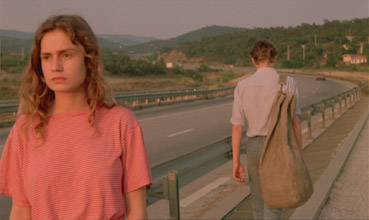
A clean and clear Dolby 2.0 mono soundtrack with distortion-free dialogue and bright reproduction of the well mixed location sound. Pialat's films are not big on loud noise and music, so there's nothing here to test the limits of the range or volume.
A loaded package spread across two discs and the custom booklet of essays that will have your head spinning with the sheer amount of analytical detail on the film. This is an instant expert package that keeps on giving, making you want to watch the film multiple times to spot everything talked about. I've no doubt that all I've learned here will enrich many subsequent viewings.
The Booklet is the best place to start and the package's most informative supplement. As is my custom with Masters of Cinema discs, I tend to read the essays before viewing the film. Not only does the contextual background give me a far greater understanding of what I'm watching when it comes to periods, movements and directors of cinema I'm unfamiliar with, by the time I'm through it has me positively salivating for the viewing experience, as was the case here.
The 48 pages comprise two essays, both brand new explorations of the film written in 2010. Dan Sallit's essay that shares its title with the film, paints a picture of Pialat as a man who distrusted the simplifying of reality in fiction, striving through improvisational methods to imbue all he did with a sense of the real world. Notably here for the third time, he infused his film's story with elements ripped straight out of his relationship with Arlette Longmann, a collaborator of fifteen years and the screenwriter for this film.
The essay details how he facilitated and encouraged the discontent between himself and the actors on the set to directly feed into his story of family warfare. This same antagonism was applied towards his narrative structure, seeing "perfection as the enemy of art". Sallit lists in bullet points, the various techniques Pialat employed as a kind of reverse engineering of all the kinks that would ordinarily be ironed out in the editing room. This excellent essay is the single best bit of film criticism I've read thus far this year and Sallit's emphasis and understanding of the importance of minutia is at times, truly astounding.
"The Pialat Code" by Craig Keller, is a grab bag of discussion points from a three-hour conversation between Maurice Pialat and Jean-Luc Goddard in 1984, following Goddard's recent return to cinema screens. The focus is on connecting themes between their work and a back n' forth debate on the merits of auteur theory. It turns out that the absence of scenario championed in Sallit's essay is here, something Pialat regrets his film's not having. The conversation is at times unexpectedly hilarious. Goddard calls Pialat's supposed masterstroke a "rush job". To get an honest account of opinion like this between filmmakers is so refreshing in an age of self-congratulatory game-playing and back-slapping, where artists refuse to see any of the flaws in the work of their colleges out of fear of it affecting their relationships in Hollywood.
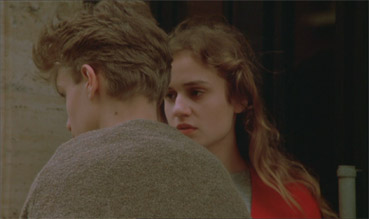
Goddard comes across as a staunch film theorist, as verbose and enthusiastic (but not half as tiring) as Quentin Tarantino. Like his direct descendant, he peppers his line of questioning with examples of cinema from all eras; for Goddard it's never enough to know the names of films, actors and directors, he can also easily recall specific lighting techniques and how many sets a film was shot on. Pialat is his polar opposite, happy to let him pontificate at length before cutting him off at the legs with terse, dismissive statements. Pialat spends the duration moaning about budgetary concerns that have dogged his career up to this point, claiming he was in a less than enthusiastic mood when he shot A Nos Amours due to lack of funding. When Goddard suggests this is the kind of film he was supposed to make, Pialat corrects him, saying it was the kind of film he was forced to make. The duo makes for an entertaining odd couple.
Disc 1
Interview with Sandrine Bonnaire (16:00)
Conducted three months after Maurice Pialat's death in April 2003, a 36-year-old Sandrine Bonnaire appears almost no different than she was back in 1983. Questioned about her teenage opinion of Pialat, it's quickly apparent she saw him more as a second father than as a director; responsible for everything that has happened to her since. She was only able to say this for the first time, three days before Pialat's death in hospital, something Bonnaire believes Pialat had been waiting to hear all those years later, after her 16-year-old self crushed Pialat at the film's premiere and during promotional duties, insisting that she was an awful, ugly actress. Pialat, very proud of the finished film and her performance in it, despite his mood during its making, was deeply hurt by this and never quite able to get over it until this last minute apology.
Pialat emerges not only as a hugely influential figure for Bonnaire, but also her real-life father. She credits Pialat's spending time with her father during the shoot and using his discordant relationship with his daughter to guide his own performance as the linchpin that enabled them to re-establish their relationship after shooting was completed and open a dialogue. On his deathbed, by way of thanks, Bonnaire's father insisted she make another film with Pialat, which she did, 1987's Sous le soleil de Satan.
The interview speaks to the depth of connection it is possible for certain directors to have with certain actors. Bonnaire is never insincere about her relationship or the greatness of the man, and as such her reverence is quite moving.
Original French Trailer (1:24)
A flurry of contradictory statements that show Suzanne's confusion about love, romance and sex, expressing a disconnect and lack of interest in the one thing the images show her doing throughout. Though the film's transfer is near faultless, I was left to wonder about the extent of restoration and digital clean up as even this trailer from the 80's looks superb, in fact the best condition of any of the era I've seen. Usually, when you watch the original trailer of an older film after viewing a newly restored print, you see a shocking chasm of difference between the two. Not the case here.
6x Maurice Pialat Trailers
Trailers for all the other Maurice Pialat films in the Masters of Cinema series.
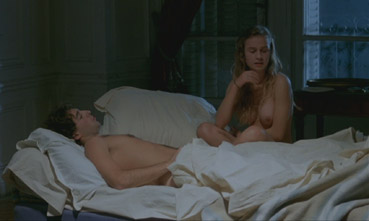
Disc 2
"L'Oeil Humain" Documentary (55:00)
The centerpiece extra of disc 2 is a 1999 documentary narrated by Xavier Giannoli, the director of Gérard Depardieu comeback film, The Singer. This "film school in a box" dissection of A Nos Amours, featuring critics associated with Cahiers du Cinéma and members of the cast and crew is a series of scholarly talking heads whose readings I more often than not, found pretentiously overreaching and grasping at straws. The irony has obviously escaped everyone involved that during fifty-five minutes of theory, we're told that Pialat was a director who feared theoretical discussions that might precede a spectator's direct relationship with the film and effect his or her ability to tap into the film's particular brand of sensuality.
Of course a documentary that is this comprehensive is not without merit and many interesting opinions on how we might engage with the film are offered. Pialat's one-time lover and frequent collaborator says she likes films that give her room to finish off herself. This fires her imagination and she gets bored if a film passively spoon-feeds her to the point where's she's not allowed to think. It is suggested that Suzanne sleeps around yet rejects Luc, her one steady boyfriend, because fulfillment is impossible when you're in love. Suzanne, is happy as can be and has all she needs, and f**ks these other boys because you can't ever be happy in Eden.
Many of the contributors note the difference between a set where "anything goes" and real improvisation, that in Pialat's hands is a considered directorial choice, inclining the actors to experiment without straying outside the lines of the script.
With not as much meat on the bones as the length might indicate, it's still worthy of a watch if nowhere near as satisfying as the Sandrine Bonnaire interview or the essays in the booklet.
Maurice Pialat Ou La Mise A Nu (14:00)
During this televised interview with Maurice Pialat on the set in the middle of filming, we learn a philosophy of acting that Pialat is sure actors loathe to hear: that critics and audiences alike, often credit actors with qualities they don't have. "Presence is all that matters, that's why some are patchy but still good".
Most interesting of all, is that the interview is interspersed with many filmed scenes that didn't make it into the final cut. This isn't your usual round up of deleted scenes fodder, all are good enough to make you question why they weren't included.
Screen Tests (31:00)
A collection of 1982 screen tests of young hopefuls (some here were cast, others not so lucky) that essentially give you eleven different versions of scenes from the film based on different actor's improvisations of the script. While certainly interesting enough to stick through till the end to see the myriad of possible interpretations, at thirty-one minutes, it's far too long.
One of the worst potential choices for the role of the brother seems to have somehow convinced someone to put him in the film anyway – I'm sure that's him playing the waiter who hits on Suzanne while she reads a book at a café.
Since his death in 2003, Maurice Pialat's reputation has continued to grow amongst film scholars and filmmakers. The efforts of Eureka's Masters of Cinema in making the bulk of his work readily available for the first time on DVD, means that cinephiles can now weigh in on the debate and judge for themselves. With this many titles for the serious film lover to be excited about, particularly if this is your first exposure to Pialat, I can't think of a better start to a beautiful friendship than A Nos Amours.
|